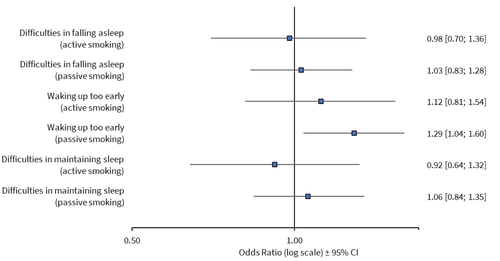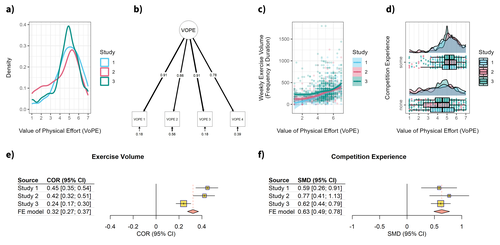
MALTAGLIATI Silvio
- Biological Sciences, University of Southern California, Los Angeles, United States of America
- Physical Activity
Recommendations: 0
Reviews: 2
Reviews: 2

Cigarette smoke exposure as a potential risk factor for sleep problems in pregnant women
Have you ever wondered about the relationship between active/passive smoking and sleep in pregnant women?
Recommended by Géraldine Escriva-Boulley based on reviews by Silvio Maltagliati, Florian Chouchou and Jean-Philippe ChaputPregnancy has been shown to affect the quality, duration, and pattern of sleep (Paavonen et al., 2017; Reid et al., 2017). These changes have important implications, as insufficient sleep is associated with health problems and complications during labor. In line with studies investigating the general population, a few studies focused on pregnant smokers and have also shown a prevalence of sleep abnormalities (e.g., Danilov et al., 2022; Lange et al., 2018; Paavonen et al., 2017). Studies examining the role of passive smoking on sleep are rare, be it in the general population or in pregnant women.
The aim of the Ciochon et al. study was to investigate the relationship between active or passive smoking and three types of sleep problems during pregnancy: difficulty falling asleep, difficulty staying asleep, and waking up too early. The authors hypothesized that pregnant women's exposure to smoking (active and passive) would increase their risk of sleep problems during pregnancy.
Participants were part of a larger study: the Corona Mums project, which included 3365 pregnant women from Poland, aged 18 to 43 years. These women completed an online questionnaire during the COVID-19 pandemic, from May 2020 to September 2021. The authors conducted multivariate logistic regressions that included the following control variables: socio-demographic, pregnancy-related variables, and psychological variables.
The results of the study showed that passive smoking is a risk factor for waking up too early, but they showed no evidence suggesting that active or passive smoking was related to any of the other sleep variables. The authors highlighted the roles of control variables included in the models. Specifically, sleep difficulties were related to age, place of residence, education, level of anxiety and depression in pregnant women, and the presence of nausea or vomiting. Further, in all the models, the level of anxiety, depression, and trimester of pregnancy (3rd trimester in comparison to 1st and 2nd) were significantly related to the risk of occurrence of sleep problems.
While only one of the six examined associations showed statistical significance, the findings are still useful in highlighting potential risks associated with passive smoking and sleep disturbances during pregnancy. The study also underscores the need for more comprehensive investigations, including direct measures of sleep quality, such as actigraphy or polysomnography, which are necessary to better understand the underlying mechanisms and to confirm the potential impacts of both active and passive smoking on sleep during pregnancy.

Development and validation of the Value of Physical Effort (VoPE) scale
Capturing Individual Differences in the Valuation of Physical Effort
Recommended by Boris Cheval based on reviews by Silvio Maltagliati and Erik BijleveldHowever, beyond this general view of physical effort as an aversive experience to be avoided, substantial individual differences in the valuation of physical effort have been observed. This suggests that some individuals may actually evaluate physical effort positively. Contrary to the law of least effort, these individuals may prefer behavioral alternatives that require more effort, all else being equal (Inzlicht et al., 2018). Until the development of the Physical Effort Scale (Cheval et al., 2024) and the present work by Bieleke et al. (2024), no formal scale existed to capture such individual differences in the valuation of physical effort. The primary goal of the present study was to design, develop, and validate such a scale.
To achieve this goal, the authors conducted three independent studies (total N = 1,364) to establish the psychometric properties of the Value of Physical Effort (VoPE) scale (Bieleke et al., 2024). Across these studies, using both cross-sectional and longitudinal designs and a variety of statistical techniques (e.g., psychometric network analysis, elastic net regression), results indicated that the VoPE scale has robust associations with physical activity behaviors, strong test-retest reliability, and captures unique variance in predicting exercise behaviors. Taken together, these findings suggest that the VoPE scale is a valid and reliable measure of individual differences in the valuation of physical effort.
Bieleke M, Stähler J, Wolff W, Schüler J. Development and validation of the Value of Physical Effort (VoPE) scale.PsyArXiv. 2023, version 5. https://doi.org/10.31234/osf.io/pqw26. Peer-reviewed and recommended by Peer Community in Health and Movement Sciences. https://doi.org/10.24072/pci.healthmovsci.100115
Cheval B, Boisgontier MP. The theory of effort minimization in physical activity. Exerc Sport Sci Rev. 2021;49(3):168-178. https://doi.org/10.1249/JES.0000000000000252
Cheval B, Maltagliati S, Courvoisier DS, Marcora S, Boisgontier MP.Development and validation of the physical effort scale (PES). Psychology of Sport and Exercise. 2024;72:102607. https://doi.org/10.1016/j.psychsport.2024.102607
Inzlicht M, Shenhav A, Olivola CY. The effort paradox: effort is both costly and valued. Trends Cogn Sci. 2018;22(4):337-349. https://doi.org/10.1016/j.tics.2018.01.007